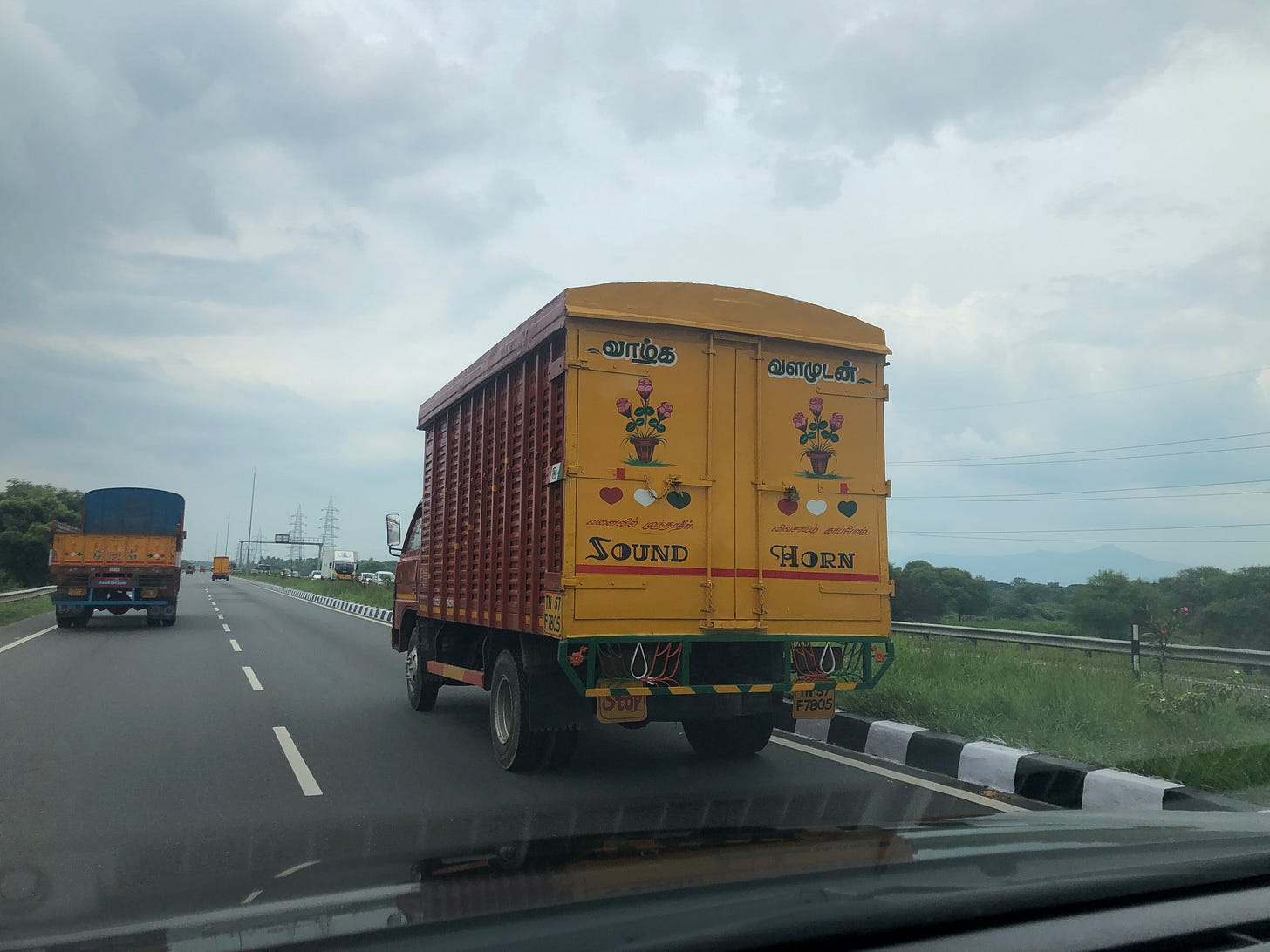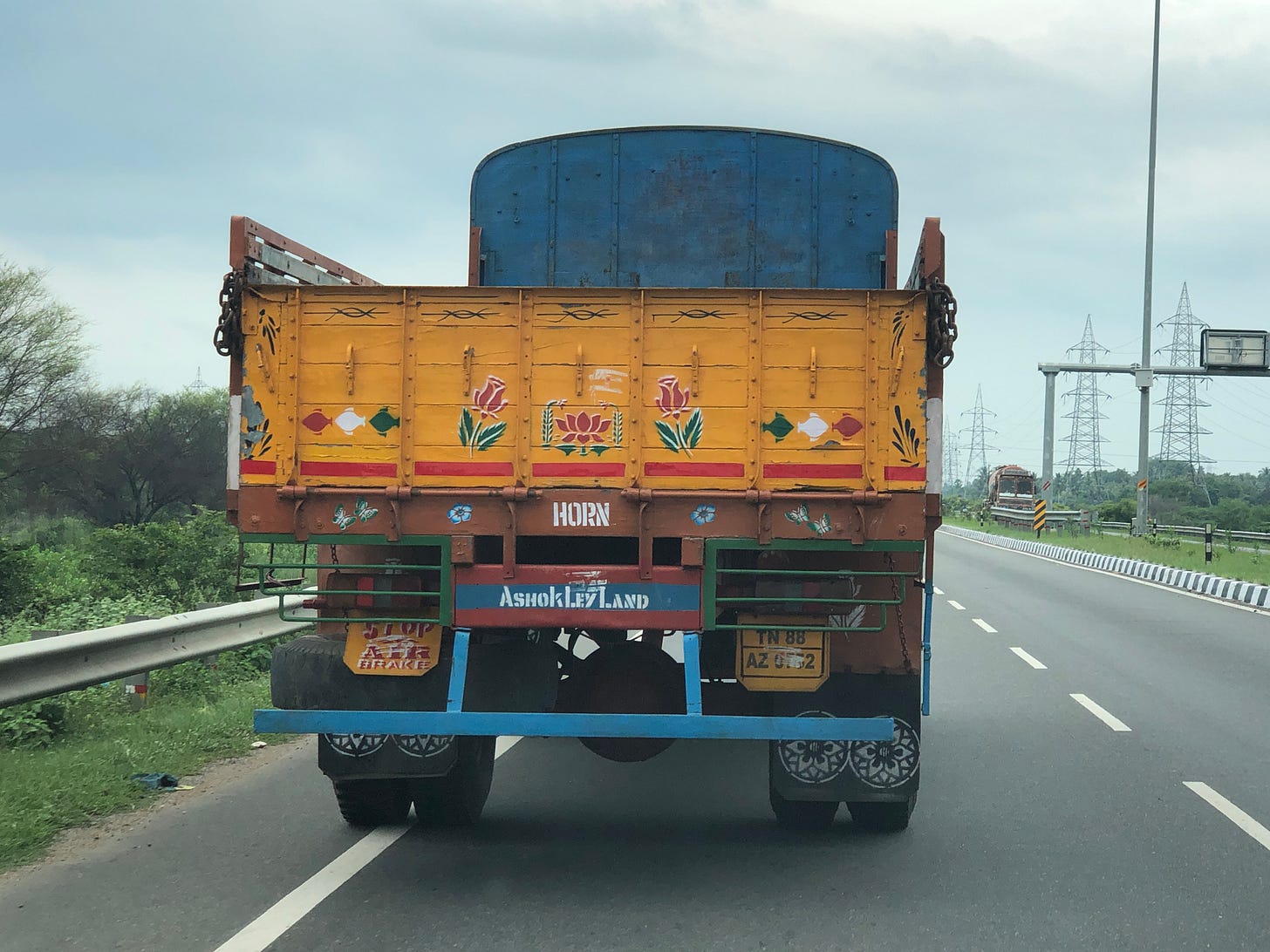Honking
The love language of Indian roads
As some of you may know, we were recently traveling in Sri Lanka while the kids were on a school break. We rented a big passenger van to clock our kilometers in roomy comfort, and man oh man, mucho kilometers we did clock. I guess all that wear and tear on the van finally caught up to us and while we were passing someone, they honked. It was unusual, since typically only the passing vehicle honks as they haul butt past the slower driver. Ravi turned his head to the car and saw a man gesturing toward the wheel of our van. He asked our driver to pull over and they both got out to investigate. Hopefully it was not a booby trap set by the spider. Aha! A front hubcap was loose and dangerously close to wobbling off into the Sri Lankan roadside jungle abyss.
Honking. Depending on the context and where you live, this can be recognized as a four-letter word, or simply seen as helpful advice. If someone cuts you off, a quick beep is the auditory version of giving the middle finger. Proceed with caution! At the same time, a passerby may honk to draw your attention to something wrong with your vehicle. That van in Sri Lanka still has all four hubcaps. Thank you, kind sir!
Honking in Hawai’i was rare, and I’d imagine more from tourists than locals. I can’t remember honking, myself, in the four years we lived there. But, if I did, then I’m certain the shame I felt in doing so has forced me to push the memory to the dark recesses of my brain with all the other undignified acts I’ve committed.
On the other side of the honking spectrum, however, was Seattle/Tacoma. We shipped our minivan via barge from Honolulu to the Port of Tacoma. We picked it up and pulled away from the main road to merge onto the freeway in our new home state. I had a huge grin on my face, my hands were at 10 and 2, and we were just brimming with hope and excitement and optimism for the start of our new journey. Before the merge was even halfway complete, my happiness was quickly abbreviated by a menacing, honking Camaro. Not just any honk though, it was an everlasting gobstopper of a honk whereby I thought the driver had simply stroked out and was sure to be seen face down on the steering wheel.
I glanced over as he wildly raced past me and, nope, his head was upright, alert, and trained right on mine. He gunned his accelerator and waved his free arm and middle finger in the air by which to say “the speed limit is 90 when I’m on the road, grandma!” I remember feeling nervous and scared since it had been so long since I’d heard a horn honk, let alone at me and with such hatred. This experience underscored both my commitment to not honking unless danger was involved and also my disdain for the stereotypical Camaro driver. (No offense to the 1 or 2 decent ones out there.)
Now that we are in India, my theories on honking have evolved yet again. Honking is a universal language spoken by every vehicle on the road here. Motorbikes, autos, cars, buses, lorries. They all honk, all the time, for every reason you could possibly conjure. The rules of honking are as follows: HONK if you are turning, passing, driving, driving slow, thinking about turning, see a cow, see a person, see a horse, see a horse being led by a man on a motorbike, etc… Actually, I guess the only rule of honking is that there is no rule. The lawlessness surrounding honking etiquette here is contagious, so much so that you begin to realize the practicality surrounding the practice.
I stood at the top of our road, on a random Tuesday afternoon. This is light traffic, and normal honking for the amount of vehicles on the road.
How many billboards or bumper stickers have you seen with the general phrase of “Watch out for motorcycles”? The hard part is that you are only using one of your 5 senses (or 6 if you’re Bruce Willis) to assist your driving awareness. Imagine how adding the sense of sound could augment your driving abilities, telling it 2 times the amount of data it usually gets. The roads, and the vehicles on them, become twice as safe as they would be without the honking.
Now, I’m not suggesting that simply the addition of honking makes roads safe. It does not. According to the Indian government’s road safety statistics, India ranks 1st in road accident deaths out of 199 countries. That is a horrible thing to rank #1 at. They are followed by China (the only other country with a billion people), and then by the United States. What I am saying, though, is that being able to both see and HEAR the traffic and vehicles around you would probably improve the safety of the roads.
In the age of silent hybrid and electric cars, I’m imagining that a few beeps of “here I am!” will help out in a lot of situations. I’m not sure how many times I found myself on the street in my neighborhood in Hawai’i, driving my ultra-quiet hybrid minivan, stuck behind a kid (or a 40-year-old man) on an electric skateboard running slaloms in front of me. What a pickle. He cannot hear me behind him, so he is going about his leisurely activity of pretending to be Bode Miller, unaware of my presence. But, unless I make myself known, I will have to wait until he either passes my driveway or happens to turn around for an unrelated reason and sees me behind him. What did I do? Each and every time, I drove noiselessly behind until I got to my driveway. The bike rider, skateboarder, or hover boarder ended up being none the wiser. I never wanted to disrupt the calm energy and honk-free culture of the islands.
Now that I’ve been witness to the honking lifestyle of eastern living and the fringe benefits that come along with it, I think I’ll be better prepared to respond to certain driving situations back in the states. I know there are other unruly Camaro drivers in my future, as no one is safe from them. But the next time one inevitably honks at me, I might just honk back. MIGHT.




